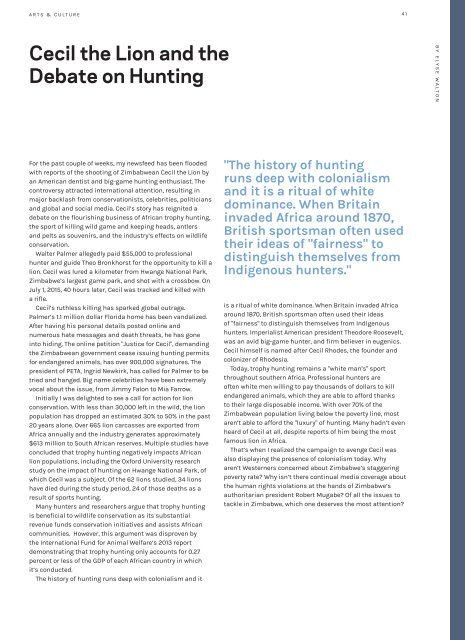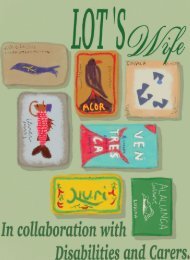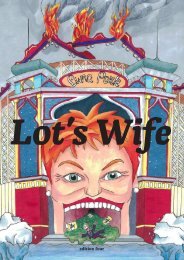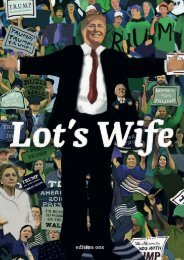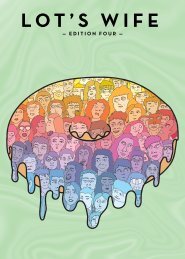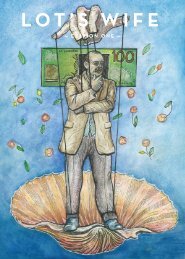Lot's Wife Edition 6 2015
Create successful ePaper yourself
Turn your PDF publications into a flip-book with our unique Google optimized e-Paper software.
ARTS & CULTURE 41<br />
Cecil the Lion and the<br />
Debate on Hunting<br />
BY Elyse Walton<br />
For the past couple of weeks, my newsfeed has been flooded<br />
with reports of the shooting of Zimbabwean Cecil the Lion by<br />
an American dentist and big-game hunting enthusiast. The<br />
controversy attracted international attention, resulting in<br />
major backlash from conservationists, celebrities, politicians<br />
and global and social media. Cecil’s story has reignited a<br />
debate on the flourishing business of African trophy hunting,<br />
the sport of killing wild game and keeping heads, antlers<br />
and pelts as souvenirs, and the industry’s effects on wildlife<br />
conservation.<br />
Walter Palmer allegedly paid $55,000 to professional<br />
hunter and guide Theo Bronkhorst for the opportunity to kill a<br />
lion. Cecil was lured a kilometer from Hwange National Park,<br />
Zimbabwe’s largest game park, and shot with a crossbow. On<br />
July 1, <strong>2015</strong>, 40 hours later, Cecil was tracked and killed with<br />
a rifle.<br />
Cecil’s ruthless killing has sparked global outrage.<br />
Palmer’s 1.1 million dollar Florida home has been vandalized.<br />
After having his personal details posted online and<br />
numerous hate messages and death threats, he has gone<br />
into hiding. The online petition "Justice for Cecil", demanding<br />
the Zimbabwean government cease issuing hunting permits<br />
for endangered animals, has over 900,000 signatures. The<br />
president of PETA, Ingrid Newkirk, has called for Palmer to be<br />
tried and hanged. Big name celebrities have been extremely<br />
vocal about the issue, from Jimmy Falon to Mia Farrow.<br />
Initially I was delighted to see a call for action for lion<br />
conservation. With less than 30,000 left in the wild, the lion<br />
population has dropped an estimated 30% to 50% in the past<br />
20 years alone. Over 665 lion carcasses are exported from<br />
Africa annually and the industry generates approximately<br />
$613 million to South African reserves. Multiple studies have<br />
concluded that trophy hunting negatively impacts African<br />
lion populations, including the Oxford University research<br />
study on the impact of hunting on Hwange National Park, of<br />
which Cecil was a subject. Of the 62 lions studied, 34 lions<br />
have died during the study period, 24 of those deaths as a<br />
result of sports hunting.<br />
Many hunters and researchers argue that trophy hunting<br />
is beneficial to wildlife conservation as its substantial<br />
revenue funds conservation initiatives and assists African<br />
communities. However, this argument was disproven by<br />
the International Fund for Animal Welfare’s 2013 report<br />
demonstrating that trophy hunting only accounts for 0.27<br />
percent or less of the GDP of each African country in which<br />
it’s conducted.<br />
The history of hunting runs deep with colonialism and it<br />
"The history of hunting<br />
runs deep with colonialism<br />
and it is a ritual of white<br />
dominance. When Britain<br />
invaded Africa around 1870,<br />
British sportsman often used<br />
their ideas of "fairness" to<br />
distinguish themselves from<br />
Indigenous hunters."<br />
is a ritual of white dominance. When Britain invaded Africa<br />
around 1870, British sportsman often used their ideas<br />
of "fairness" to distinguish themselves from Indigenous<br />
hunters. Imperialist American president Theodore Roosevelt,<br />
was an avid big-game hunter, and firm believer in eugenics.<br />
Cecil himself is named after Cecil Rhodes, the founder and<br />
colonizer of Rhodesia.<br />
Today, trophy hunting remains a "white man’s" sport<br />
throughout southern Africa. Professional hunters are<br />
often white men willing to pay thousands of dollars to kill<br />
endangered animals, which they are able to afford thanks<br />
to their large disposable income. With over 70% of the<br />
Zimbabwean population living below the poverty line, most<br />
aren’t able to afford the "luxury" of hunting. Many hadn’t even<br />
heard of Cecil at all, despite reports of him being the most<br />
famous lion in Africa.<br />
That’s when I realized the campaign to avenge Cecil was<br />
also displaying the presence of colonialism today. Why<br />
aren’t Westerners concerned about Zimbabwe’s staggering<br />
poverty rate? Why isn’t there continual media coverage about<br />
the human rights violations at the hands of Zimbabwe’s<br />
authoritarian president Robert Mugabe? Of all the issues to<br />
tackle in Zimbabwe, which one deserves the most attention?


